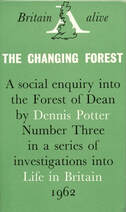|
In a new podcast from our sister-project, Voices from the Forest, local people describe life in the Forest of Dean during the latter half of the twentieth century. This was a period of transformation for the Forest as old industries and centuries-old traditions gave way to new factories, and new social, economic and cultural aspirations. It was a rich period too for literary activity in the Forest. The nineteenth century had seen the birth of Forest of Dean literature with the work of Catherine Drew, Richard Morse, William Wickenden, and Phillip Ducarel; the mid to late twentieth century was arguably its golden age. Winifred Foley, Leonard Clark, Harry Beddington, Joyce Latham, and Dennis Potter were amongst those Forest-rooted writers working on memoirs, poetry, drama, fiction and commentary that described the subtly shifting patterns of people’s lives, places, and landscape as the Forest of Dean adjusted to the reality of a changed post-War world. Since 2015 Voices in the Forest has been interviewing and recording Forest of Dean residents’ recollections of life in the Forest (and sometimes periods of life spent further afield), following their lives from childhood and school, to first jobs, careers, relationships and families. The interviews offer a fascinating background to the period in which Winifred Foley was ‘In and Out of the Forest’, before eventually settling back here; when Harry Beddington was writing dialect plays for the local stage and, honing his poetry, humour and polemic into what would become ‘Forest of Dean Humour’ and ‘Forest Acorns’ published in the early 1960s. Leonard Clark meanwhile had left the Forest before the War but this second half of the century was when he documented life in the earlier Forest in his memoirs such as ‘Green Wood’ and ‘A Fool in the Forest’, when he eulogised about the Forest in his poetry, and broadcast about it in programmes on BBC Radio.  Dennis Potter too had by this time moved away, first for university then to work for the BBC, later becoming one of the country's foremost television and film dramatists. But for him too, the Forest was ever a source of inspiration and subject matter. Even before it featured so memorably in his series ‘Pennies From Heaven’ and ‘The Singing Detective’, he wrote about it extensively in his first book, ‘A Glittering Coffin’. He returned to it in full just a few years later with his book ‘The Changing Forest’, a masterpiece of proto-New Journalism. In it Potter explored his personal relationship with the people and places of the Forest whilst at the same time delivering his pin-sharp analysis of the economic and social realities of a community that was at a potentially pivotal moment in its history. This is the world described in depth too by the remarkable Voices from the Forest recordings drawn on in the new podcast series over six episodes. Episode 1 begins with the period immediately preceding that of ‘The Changing Forest’: the Second World War. As Voices from the Forest Co-Director and presenter of the podcast Roger Deeks puts it, the War was something that “would shake the dust off the Forest and leave it a different place”. In the first episode we hear how the War brought an influx of people into the Forest such as Lumber Jills, G.I.’s and Italian and German Prisoners of War, and whilst there was the threat of stray bombs or the fear of invasion, it was also a time of liberation for some Foresters as many of the older restrictive social norms simply fell away. For anyone interested in the fascinating and fertile background to those prolific Forest authors of the latter-twentieth century, this podcast is a must listen! Episode 1 of the Voices from the Forest Podcast is published on Monday 1st February (2021) and can be listened to, from then on, via the 'Podcast' page on the Voices from the Forest website (and if you've never listened to podcasts before it's easy: just go the page and click the 'play' button).
0 Comments
Leave a Reply. |
Archives
June 2024
|

 RSS Feed
RSS Feed


